Elder farmers in Japan to use power suits in the future?
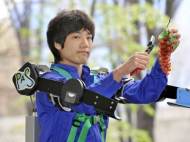 We already wrote about various power suits, but this one differs in its purpose. A Tokyo Agriculture and Technology (TAT) University postgraduate student is seen demonstrating the new power-assist suit for elderly agriculture workers, developed by Tokyo University of Agriculture and Technology professor Shigeki Toyama. He plans to set up a company in order to start producing the futuristic outfit by the end of the year.
We already wrote about various power suits, but this one differs in its purpose. A Tokyo Agriculture and Technology (TAT) University postgraduate student is seen demonstrating the new power-assist suit for elderly agriculture workers, developed by Tokyo University of Agriculture and Technology professor Shigeki Toyama. He plans to set up a company in order to start producing the futuristic outfit by the end of the year.
The team has developed a heavy-duty 30 kilogram (66 pound) model, for lifting big loads and pulling vegetables out of the ground, and a 23 kilogram version designed for lighter tasks such as picking grapes. Unlike the other power suits meant to enhance the strength, this power suit reduces the muscular activity while the user is performing tasks as picking or crouching. They are developing algorithms in order to enable the power suit to perform more tasks without an effort.
The metal-and-plastic exoskeleton boasts eight electric motors that amplify the strength of the wearer’s arms and legs, as well as sensors that can detect movements and respond to commands through a voice-recognition system. The inventors claim the robo-suits can reduce the user’s physical effort by 62 percent on average
“If the farmer bends over to grasp a radish, his back will be firmly supported,” said Gohei Yamamoto, one of the students working on the team, as he recently demonstrated the suit on his university campus. “A brief vocal instruction will instantly straighten the rods along his legs, giving him the power he needs to pull the vegetable without effort.”
By the end of the year Toyama plans to start working on augmented reality glasses (goggles) on which useful information could be displayed for the farmer. Useful information might include how ripe the grapes are, or the user’s heart rate and calorie consumption, said Toyama. “The goggles would tell you for instance how long you’ve been working and when you should rest.”
The suit should hit the Japanese market in 2012, when it will initially retail for about one million yen ($ 11,000), a price tag its makers hope to halve if the device is mass-produced, the team said. “I doubt that the suit would sell in Europe and in America, where foreign migrants workers often perform farm-related tasks,” Toyama said.
Te suit still needs to be less clunky regarding its size as well as the performance, since it seemed a bit unnatural in the demonstration. We hope the next generation is more organic and that it will conform with the human body as some of the other power suits.

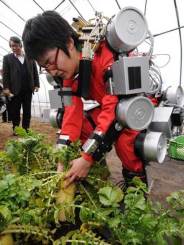


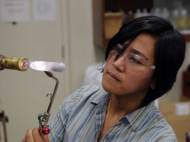

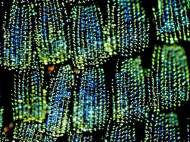
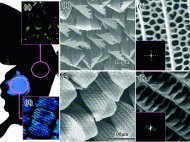
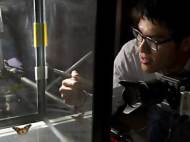

Leave your response!